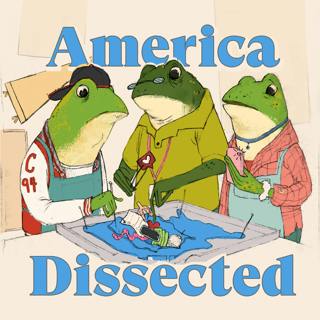
Don’t Pay Attention with Casey Schwartz
The pandemic drove major increases in depression, anxiety, and ADHD. But rates of ADHD–and its treatment–have been skyrocketing even before the pandemic. Abdul reflects on how our surroundings may be driving this. He sits down with Casey Schwartz, author of “Attention, a Love Story” to learn more about the history and future of ADHD.
30 Elo 202247min

Conceiving the Anti-Abortion Movement with Prof. Karissa Haugeberg
The anti-abortion movement notched a terrible win six weeks ago. But reasserting the right to a safe, legal abortion nationwide forces us to go back in time and understand the opposition. Abdul sits down with Prof. Karissa Haugeberg, a historian of the anti-abortion movement, to understand how it formed–and what it will take to fight back.
23 Elo 202249min

Negotiating Prescription Drug Prices with Prof. Aaron Kesselheim
The Inflation Reduction Act of 2022 is a lot of things…including a healthcare reform bill. Along with extending healthcare subsidies for 13 million people, it also, for the first time, allows Medicare to negotiate prescription drug prices. Abdul lays out what the Inflation Reduction Act means for prescription drug prices and sits down with Prof. Aaron Kesselheim, a physician, attorney, and prescription drug policy expert, to understand what this will mean for America.
16 Elo 202238min

Screening Sunscreen? with Amanda Mull
It’s early August–it’s hot and sunny. And for many people, it’s sunburn season. But the long-term consequences of sun exposure can be a lot worse than just a sunburn. Americans have fewer and worse sunscreen options than their counterparts abroad–and those options mean fewer people will wear it. Abdul speaks with Amanda Mull, staff writer at the Atlantic, about the bureaucratic issue standing in the way.
9 Elo 202234min

50 years after Tuskegee with Prof. Rueben C. Warren
50 years ago, it was discovered that the United States Public Health Service and the CDC–the federal government–had left nearly 400 Black men with syphilis untreated for 30 years to study the long term consequences of the disease. They told these men that they were providing them free healthcare. The consequences of this inhumane, disgusting study still echoes among Black Americans today–leaving many deeply mistrustful of the healthcare institutions that are supposed to provide treatment. Worse still, the same attitudes about Black people continue to shape medical and public health interactions. Abdul sits down with Dr. Rueben C. Warren, Director of the National Center for Bioethics in Research and Healthcare at Tuskegee University and former Associate Director of Minority Health at the CDC, to talk about the history of the study and its lasting implications for health inequities.
2 Elo 202249min

Presidential COVID with Dr. Megan Ranney
The president of the United States has COVID. Again. Abdul reflects on what this signals in the pandemic–and our politics. Then he sits down with Dr. Megan Ranney, Emergency Medicine physician and Academic Dean of Public Health at Brown University.
26 Heinä 202247min

Big Leaky Tech with The Markup
The fall of Roe has opened up the risk that authorities could use data from period tracking apps or internet searches in legal proceedings in abortion ban violations. But Big Tech may already be tracking a lot more about your health than you know. Todd Feathers and Simon Fondrie-Teitler of The Markup join Abdul to share their reporting.
19 Heinä 202237min

What the Discovery of Blood Flow Can Teach Us About Science Itself with Dr. Dhun Sethna
For most of human history, people believed that blood flow was a one-way thing. The discovery that blood flowed two ways–that there was a circulatory system–didn’t happen until the mid-1600s. And it took more than a century for that discovery to be formally adopted by most scientific institutions. Abdul goes back in history to help us understand the resistance to science in the present. He interviews Dr. Dhun Sethna, a cardiac anesthesiologist and author of “The Wine Dark Sea Within” about the discovery of the human circulatory system and it’s implications for our time.
12 Heinä 202247min






















